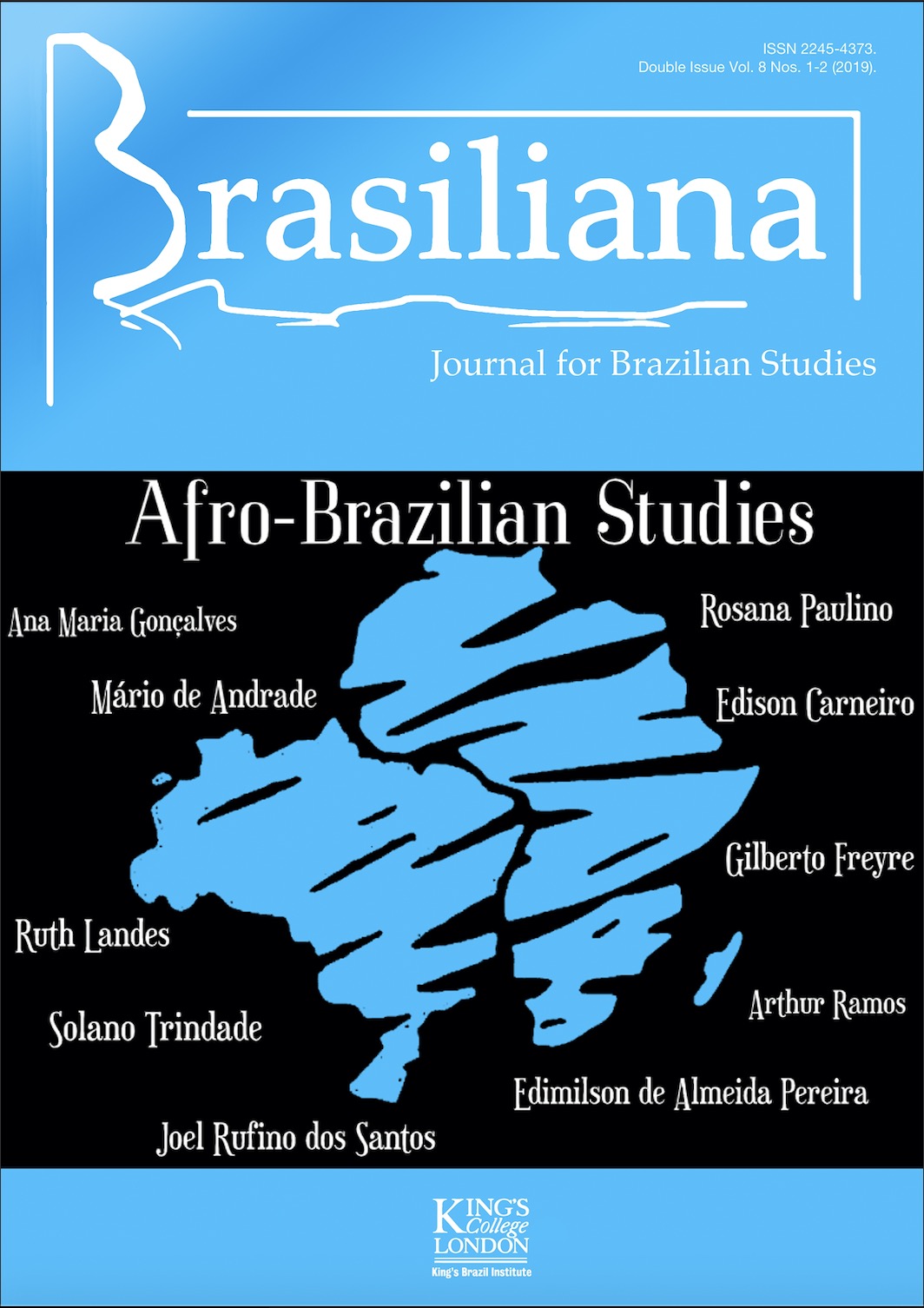O talking back da “negra africana”: o ser desencarnado e silenciado da empregada doméstica Janair em A paixão segundo G.H.
Main Article Content
Abstract
In Clarice Lispector’s A paixão segundo G.H., the character Janair is a black maid who becomes a remarkable presence precisely because of her physical absence. The character G.H., narrator of the book and Janair's former employer, expresses an eloquent silence about this Afro-Brazilian character, defining Janair as “an black African woman” and stressing her struggle to connect with Janair: “I shuddered when I finally realized that this woman was an invisible”. Due to a discriminatory process that derives from the intersection of race, class and gender, Janair occupies the space socially marked by invisibility. In Lispector’s book, the maid seems to come from another reality, looming metaphorically as a foreign, relegated, disembodied figure.
Article Details
![]()
Articles published in Brasiliana are licensed under a Creative Commons Attribution-NonCommercial-NoDerivs 3.0 Unported License.
When publishing open access, the author signs an author publishing agreement in which they retain copyright and give Brasiliana the right to publish the article. Our Open Access publications are distributed under the terms of the Creative Commons Attribution 4.0 International License, which permits unrestricted use, distribution, and reproduction in any medium, provided the original work is properly cited.
References
REFERENCES
Almeida, Sandra Regina Goulart. “Quando o sujeito subalterno fala: especulações sobre a razão pós-colonial.” Crítica pós-colonial: Panorama de leituras contemporâneas, edited by Júlia Almeida et al., 7 Letras, 2013.
Amaral, Márcia Franz. “Lugares de fala: Um conceito para abordar o segmento popular da grande imprensa.” Contracampo, no. 12, 2005, pp. 103-14.
Arêas, Vilma. “A hora da estrela.” Clarice Lispector com a ponta dos dedos. Companhia das Letras, 2005, pp. 74-108.
Campt, Tina. Listening to Images. Duke UP, 2017.
Chaui, Marilena. Brasil: Mito fundador e sociedade autoritária. Fundação Perseu Abramo, 2000.
Collins, Patricia Hill. Black Feminist Thought: Knowledge, Consciousness, and the Politics of Empowerment. Routledge, 2000.
Costa, Emilia Viotti da. Crowns of Glory, Tears of Blood: The Demerara Slave Rebellion of 1823. Oxford UP, 1994.
Derrida, Jacques. Positions. Translated by Allan Bass, U of Chicago P, 1982.
DiAngelo, Robin. “White Fragility.” International Journal of Critical Pedagogy, vol. 3, no. 3, 2011, pp. 54-70.
Fernandez, Raffaella. Processo criativo nos manuscritos do espólio literário de Carolina Maria de Jesus. Tese de doutorado, Universidade Estadual de Campinas, 2015.
Finch, Aisha K. Rethinking Slave Rebellion in Cuba: La Escalera and the Insurgencies of 1841-1844. The U of North Carolina P, 2015.
Freyre, Gilberto. Casa-grande & senzala: Formação da família brasileira sob o regime da economia patriarcal. Global Editora, 2005.
___. Sobrados e mucambos: Decadência do patriarcado rural e desenvolvimento do urbano. Global Editora, 2003.
Goh, Irving. “Le Toucher, le cafard, or, On Touching—the Cockroach in Clarice Lispector’s Passion according to G.H.” MLN, vol. 131, no. 2, Mar 2016, pp. 461-80.
Gonzalez, Lélia. “Racismo e sexismo na cultura brasileira.” Revista Ciências Sociais Hoje, Anpocs, 1984, pp. 223-44.
Gordon, Avery F. Ghostly Matters: Haunting and the Sociological Imagination. U of Minnesota P, 2008.
Gotlib, Nádia Battella. Clarice Fotobiografia. Edusp, 2007.
___. Clarice: Uma vida que se conta. Editora Ática, 1995.
Jesus, Carolina Maria de. O meu sonho é escrever: Contos inéditos e outros escritos. Ciclo Contínuo Editorial, 2018.
___. Quarto de despejo: Diário de uma favelada. Francisco Alves, 1960.
Hedrick, Tace. “Mother, Blessed Be You among Cockroaches: Essentialism, Fecundity, and Death in Clarice Lispector.” Luso-Brazilian Review, vol. 34, no. 2, 1997, pp. 41-57.
Holanda, Sérgio Buarque de. Raízes do Brasil. Companhia das Letras, 2008.
hooks, bell. Talking Back: Thinking Feminist, Thinking Black. South End Press, 1989.
Kilomba, Grada. Plantation Memories: Episodes of Everyday Racism. Unrast Verlag, 2010.
Librandi, Marília. Writing by Ear: Clarice Lispector and the Aural Novel. U of Toronto P, 2018.
Lispector, Clarice. A descoberta do mundo. Rocco, Kobo edition, 2015.
___. A hora da estrela. Rocco, 1998.
___. A paixão segundo G.H. Editora da UFSC, 1988.
Malcolm, Janet. The Journalist and the Murderer. Vintage, 1990.
Mignolo, Walter. “Desobediência epistêmica: A opção descolonial e o significado de identidade em política,” translated by Ângela Lopes Norte. Cadernos de Letras da UFF, no. 34, 2018, pp. 287-324.
___. Local Histories/Global Designs: Coloniality, Subaltern Knowledges, and Border Thinking. Princeton UP, 2012.
Peixoto, Marta. “‘Fatos são pedras duras’: Urban Poverty in Clarice Lispector.” Close to the Wild Heart: Essays on Clarice Lispector. Edited by Cláudia Pazos Alonso and Claire Williams, Legenda, 2012, pp. 106-125.
Rediker, Marcus. The Slave Ship: A Human History. Penguin, 2007.
Ribeiro, Djamila. O que é lugar de fala?. Editora Letramento, Kobo edition, 2017.
Roncador, Sônia. Domestic Servants in Literature and Testimony in Brazil, 1889-1999. Springer, 2014.
Smith, Zadie. “Through the Portal: The Photography of Deana Lawson.” The New Yorker, May 7, 2018, pp. 50-9.
Spillers, Hortense. “Mama’s Baby, Papa’s Maybe: An American Grammar Book.” Diacritics, vol. 17, no. 2, Summer 1987, pp. 65-81.
Tannenbaum, Frank. Slave and Citizen. Beacon Press, 1992.
Villares, Lúcia. “The Black Maid as Ghost: Haunting in A paixão segundo G.H.” Close to the Wild Heart: Essays on Clarice Lispector. Edited by Cláudia Pazos Alonso and Claire Williams, Legenda, 2012, pp. 126-141.
Weinstein, Barbara. The Color of Modernity: São Paulo and The Making of Race and Nation in Brazil. Duke UP, 2015.
Winters, Lisa Ze. The Mullata Concubine: Terror, Intimacy, Freedom, and Desire in the Black Transatlantic. U of Georgia P, 2016.

